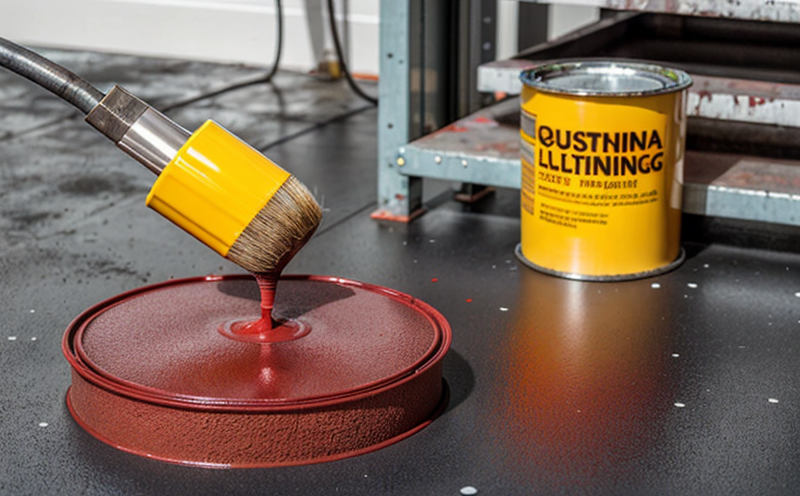EN 1062 Masonry Paints Performance Testing
The European Standard EN 1062 specifies a series of tests to evaluate the performance characteristics and durability of masonry paints. This standard is particularly important for ensuring that masonry paints meet the required standards for protection, aesthetics, and longevity in industrial environments.
Masonry paints are formulated specifically for application on brickwork, stone, concrete, and similar materials. These paints provide a protective layer against environmental factors such as moisture, UV radiation, and mechanical wear. EN 1062 testing ensures that the paint not only adheres well to masonry surfaces but also exhibits resistance to fading, cracking, and other forms of degradation over time.
The tests outlined in this standard are designed to assess various properties critical to the performance of masonry paints:
- Adhesion
- Flexibility
- Solvent Resistance
- Water Resistance
- UV Resistance
- Mechanical Abrasion Resistance
- Crocking
- Chalking
The testing process typically involves a series of physical and chemical assessments. Specimen preparation is crucial, requiring the application of paint in accordance with specified conditions to ensure accurate results. After application, specimens are subjected to environmental exposure or mechanical stress to simulate real-world use.
For instance, adhesion tests involve measuring how well the painted surface remains intact under various stressors like abrasion and impact. Flexibility checks assess whether the paint can withstand bending without cracking. Solvent resistance tests determine if the paint can maintain its integrity when exposed to common solvents used in industrial cleaning processes.
Water resistance is tested by exposing specimens to high humidity or immersion, while UV resistance involves placing samples under artificial sunlight exposure to mimic long-term outdoor conditions. Mechanical abrasion and impact resistance are crucial for ensuring that masonry paints remain intact in harsh environments where they may be subject to physical wear and tear.
The results of these tests provide valuable insights into the durability and performance of masonry paints, helping manufacturers and users ensure quality control and compliance with industry standards. This comprehensive testing ensures that only high-performing products reach the market, contributing to safer and more reliable industrial environments.
Eurolab Advantages
At Eurolab, we pride ourselves on offering top-tier services for EN 1062 masonry paints performance testing. Our state-of-the-art facilities provide the necessary infrastructure to conduct these complex tests accurately and reliably.
- Expertise: Our team of experts has extensive experience in industrial coatings testing, ensuring that every test is conducted with precision and professionalism.
- Accreditation: We are fully accredited to perform EN 1062 tests according to the latest standards.
- State-of-the-Art Equipment: Our laboratory is equipped with advanced testing equipment capable of simulating real-world conditions for thorough evaluation.
We offer a range of additional services that complement our core offerings, including custom sample preparation and analysis reports. Our commitment to quality and excellence ensures that you receive accurate and reliable results every time.
Why Choose This Test
- To ensure compliance with EN 1062 standards for industrial masonry paints.
- To verify the durability of masonry paints under various environmental conditions.
- To improve product quality and enhance customer satisfaction by identifying potential weaknesses early in development.
- To provide manufacturers with robust data to support marketing claims about their products' performance capabilities.
The EN 1062 test is essential for industrial masonry paints due to its comprehensive approach to evaluating multiple aspects of paint performance. It helps identify any areas where improvements are needed, ensuring that the final product meets all necessary specifications and performs reliably in real-world applications.
By choosing this test, you gain confidence in your products' ability to withstand harsh conditions while maintaining aesthetic appeal and protection over extended periods. This can lead to increased market competitiveness and customer trust.
Environmental and Sustainability Contributions
The EN 1062 testing process plays a significant role in promoting sustainability by ensuring that industrial masonry paints are durable, long-lasting, and environmentally friendly. By adhering strictly to this standard, manufacturers can contribute positively to environmental conservation efforts.
- Reduces Waste: Durable paints that last longer mean fewer applications over time, reducing waste generation.
- Energy Efficiency: Longer-lasting paints require less frequent replacement, which helps minimize energy consumption associated with production and transportation processes.
- Resource Conservation: Sustainable practices in paint manufacturing lead to better resource management throughout the lifecycle of the product.
In addition, by selecting sustainable raw materials and employing eco-friendly manufacturing methods during the development stage, manufacturers can further enhance their contributions towards environmental sustainability. The results from EN 1062 testing provide actionable insights that guide continuous improvement initiatives aimed at enhancing overall sustainability performance within the industry.





